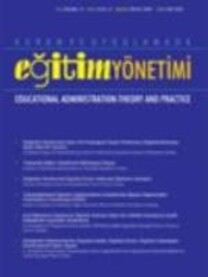Öğrenci - Veli - Okul Sözleşmesi Üzerine Bir Araştırma
Bu araştırmanın amacı, öğrenci-veli-okul sözleşmesinde yer alan sorumlulukların yerine getirilmesine yönelik öğretmen görüşlerini belirlemektir. Araştırmanın örneklemini Antalya merkez ilçe ilköğretim okullarında görevli, tesadüfi örnekleme yöntemiyle seçilen 253 sınıf ve alan öğretmeni oluşturmaktadır. Araştırma için Öğrenci-Veli-Okul Sözleşmesinde yer alan sorumluluklara yönelik bir anket hazırlanmış ve uzman görüşlerine başvurularak onayları alınmıştır. Öğretmenlerin görüşlerinin frekans ve yüzde dağılımları verilmiş, ayrıca öğretmenlerin görüşleri arasında fark olup olmadığı ise t-testi ile sınanmıştır. Öğretmenler öğrenci-veli-okul sözleşmesinde yer alan sorumluluklardan okulun sorumluluklarını, büyük ölçüde; velilerin sorumluluklarını, ara sıra ve öğrencilerin sorumluluklarını büyük ölçüde yerine getirdiklerini düşünmektedirler. Sınıf ve alan öğretmenlerinin görüşleri arasında öğrencilerin sorumluluklarını yerine getirme dışında anlamlı bir farklılık bulunmamıştır.
Anahtar Kelimeler:
öğrenci-veli-okul sözleşmesi , okulda velinin katılımı , veli sorumlulukları , öğrenci sorumlulukları
A Research on Student-Parent-School Contract
Background In 2005, Ministry of National Education issued a circular starting the implementation of Student-Parent-School contract describing responsibilities of Schools and Parents in primary and secondary schools. The purpose of Student-Parent-School contract was stated as building a culture of democracy in school by improving parent participation and involvement in school processes. Purpose The purpose of this study is to describe the teachers' views on implementation of Student-Parent-School contract and fulfillment of the responsibilities described in the contract by students, parents and schools. Method The sample of the study was 287 teachers randomly selected from form Primary Schools in Antalya City during the 2006-2007 school year. Data were collected by using an inventory developed by researcher. Reliability coefficients of Cronbach's alpha were .94 for items related to school's responsibilities, .89 for items related to student's responsibilities, and .93 for items related to parent's responsibilities. Fulfillment of responsibilities was rated on a scale from “5” always to “1” never. Data were tabulated by using means and standard deviations. Differences in teachers' views by teaching area (classroom teachers versus subject teachers) were analyzed by using t-test for independent samples. Findings and Conclusions Majority of teachers, 58% as mean percentage of 19 item scale, reported that schools are fulfilling their responsibilities listed by Student-Parent-School contract to a “grate extend” or “always”. More than 70% of teachers reported that schools are fulfilling responsibilities related to presenting good models for students, regular meetings with parents and taking preventive measures to eliminate violence in school environment. However, less than 50% of teachers reported that schools are fulfilling responsibilities related to supporting learning and development of children beyond school (45%), providing sufficient number of periodicals in the school library (44.3%), planning and implementing social service activities for students (42.3%), meeting needs of school staff (40.7%), and training for staff development (38.7%). Teachers reported that most parents are not fulfilling their responsibilities related participation in parents' education programs provided by schools, involvement in school-parents association activities, involvement and volunteering in extra-curricular activities, and regularly communicating with teaching staff about student's development. In average of 13 item parents' responsibilities scale, 39% of teachers reported that parents are fulfilling their responsibilities to a “grate extend” or “always”. Teachers think that parents are fulfilling their responsibilities at a satisfactory level only in two items; sending students to school on time (71%) and complying with school dressing code (64%). On the contrary, parents' responsibilities related to involvement in school activities, school improvement efforts and learning activities are less likely to be fulfilled, as perceived by teachers. In average of 16 item students' responsibilities scale, 49% of teachers reported that students are fulfilling their responsibilities to a “grate extend” or “always”. Students are more likely to fulfill their responsibilities related to behaving in a respectful manner to teachers (76%), to school staff (65%), to other students (57%) and complying with school rules (68%) and classroom rules (58%), and protecting school facilities (57%). However, students are less likely to fulfill their responsibilities related to participation in decision making in the school and extra-curricular activities. These findings indicate that both parents and students tend to fulfill formal responsibilities, possibly reflecting a formal bureaucratic school culture and climate. Differences in teachers' views on fulfillment of responsibilities were examined by comparing responses of classroom teachers (teaching at grade 1 through grade 5) and subject specialist teachers (usually teaching a specific subject at grade 6 through grade 8). Teachers' views on fulfillment of schools responsibilities (t252=1.252; p=.212) and parents responsibilities (t252=1.31; p=.190) did not show any significant differences. However, there was a significant difference (t252=3.93; p=.000) between classroom teachers ( =3.45; SD=.66) and subject specialist teachers ( =3.13; SD=.61). Student-Parent-School contract is a relatively new practice in Turkish primary schools. Results demonstrated that students, parents and schools are not fulfilling their responsibilities at a satisfactory level, in those areas related to students development and learning, extra-curricular activities and school-parent cooperation. The contract was put into effect with good intention of building a culture of democracy in school by improving parent participation and involvement in school processes. However, results suggest that schools should focus on increasing parent involvement and participation to reach expected outcomes.
Keywords:
student- parent-school contract , parent involvement in school , parent responsibilities in school , sudent responsibilities.,
- ISSN: 1300-4832
- Yayın Aralığı: 4
- Başlangıç: 1995
- Yayıncı: Pegem Akademi Yayıncılık Eğitim Danışmanlık Hizmetleri Tic. Ltd. Şti.
